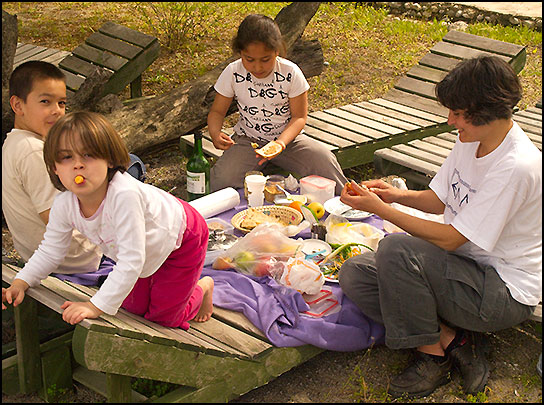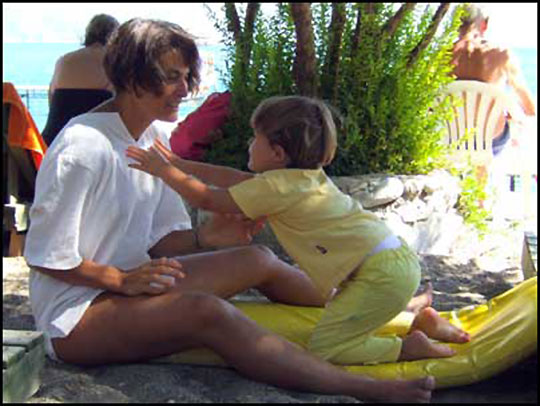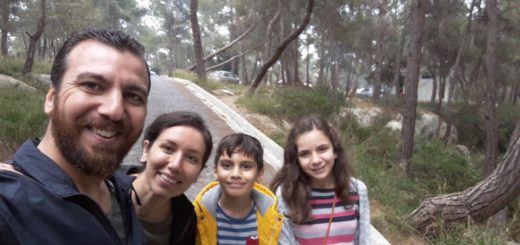Why Play With Your Child? Come On, Let’s Play!
Let’s support our children’s natural ability to play, and free our mind and take part in the game. We can nurture this ability, because play also helps couples make their relationships more lasting and satisfying.
You might recall Bambi the movie from your childhood days. It’s a classic adorned with the fine nuances and dilemmas of existence, which doesn’t reduce the view of life into a mere struggle between the good and the bad, and which appeals to both children and adults alike. It entertains a wide range of emotions that are missing in today’s cartoons. In the movie, we never see the father of Thumper the bunny, Bambi’s friend, but we hear a very valuable piece of advice of his: ‘Families who play together, stay together.’ This article is about this advice, why it is so valuable and how we can apply it to our life.
Nasreddin Hodja was asked what was most valuable on earth; he replied it was advice. He was then asked what was least valuable and his answer was the same; advice. Advice is the most valuable thing in life if followed, however if you don’t follow it, it becomes valueless.
When children play they often seem to be on another planet. A blanket and a few cushions will become a ship traveling over the ocean. At one moment they are a doctor, at another the heroes of a sophisticated fiction? They get carried away and live that moment to the full. The importance of these games is often underestimated by us grown-ups. Parents will usually say “Haven’t you got any homework, all you think is play?” Yet kids develop both physically and psychologically through play; they solve many issues during games, they socialize, and their personality takes shape.

Children develop both physically and psychologically through play; they solve many issues during games, they socialize, and their personality takes shape.
When we too enter the child’s world, we experience living in the moment, we have fun and we clear our mind of clutter. On one hand, our relationship with our child grows stronger, and on the other, we develop insight to the issues that preoccupy them. We know that when we ask ‘How was school today?’ ~ we don’t get any details but a short ‘it was OK. Yet when playing together, the child is relaxed and the events, issues that either please or annoy our children are voiced one by one thanks to the warm reciprocity of play.
Playing is perceived as an activity undertaken only by or with children and the importance of play for adults is usually not emphasized. Nevertheless, the more easily we can play games, the healthier our inner world is.
Do you know that large corporations spend millions of dollars every year training their executives to think creatively through play, because creative ability leadso to innovations that make them money?
In my therapy sessions I use a method I developed to help people ‘being in the flow’. I advise my clients to spend time to play games with children, even if they don’t have their own. When we are playful, we view ourselves with a smile and without clouds of judgement; we are light and carefree, we accept people and events around us as they are, we have a curiosity and openness to learning, we don’t require expensive ‘toys’ to feel good.
The ability to play also reveals a natural, sincere and genuine state of mind, where we experience the moment without being bogged down with problems and responsibilities. This state of mind corresponds to the state of being in the flow, creative and open to gaiety. In fact, research supports the advice of Bambi’s friend Thumper’s dad: Couples who play games together have a higher rate of staying together compared to others.

Couples who play games together have a higher rate of staying together compared to the ones who don’t.
When you have a child, you are lucky. You are in a good position to foster your playfulness skills. Let your child teach you. To do that, get in your child’s world, voice their thoughts and feelings. Don’t ask questions, do not praise, do not try to learn or teach something. All of these behaviours will remove you from ‘playing’.
Let go of your wish to control your children as long as they do not hurt themselves or their surroundings; let them choose the games. If they start causing damage, instead of saying no say “it is not appropriate to do that, if you do that I will have to stop the game”. If they continue, warn them once more saying you won’t be warning the next time but you will stop the game, and keep your promise.

If you have a child, you are lucky you are in a good position to foster your playfulness skills. Let your child teach you. To do that, get in your child’s world, voice their thoughts and feelings. Don’t ask questions, do not praise, do not try to learn something. Such behaviours just remove the joy, and benefits, of play.
Whatever your and your children’s age may be, you can definitely find games that you can play as a family. Recently we had a large family reunion. My aunt, who is in her seventies, my daughter, who is seven, and all of us in between played ‘Names and Cities’, a popular Turkish children’s word finding game. We had great fun, we looked up the words we didn’t know, and we got to know each other better.
Before I conclude, I would like to share some of the games that we play as a family, may be you would want to play them as well.
Hot-Cold Game: The player has to find an object that the group has chosen or hidden. Others give him/her direction by yelling out “hot” as he/she is nearing the object and “cold” when he/she is heading away from it.
Finding Words: The players take turns to find a word starting with the last letter of the word pronounced by the player before them.
Blind Man’s Buff: The chosen player is blindfolded. When he/she touches one of the other players, the player tagged becomes the chosen one.
Objects Game: The player is blindfolded and handed various objects. He/She first tries to make out what each one of them is and then tries to remember and name them each.
Assassin: Three pieces of paper are marked with the words “Assassin”, “Detective” and “Prosecutor” separately (or pictures are drawn for younger kids who can’t read), folded and thrown in the air. Each player picks one and reads the word on it without letting the others see. The detective tries to guess who the assassin is, if his/her guess is correct, he/she can impose a punishment on the assassin, if the player that he/she dared turns out to be the prosecutor then he/she gets punished by the prosecutor. The pieces of paper are folded and thrown again and the game goes on.
Lazybones: Each player’s name is written on three separate pieces of paper, which are then folded and thrown. Each player picks three pieces of paper and take it in turns to give one of them to the next player. The player who gets all three of the pieces with the same person’s name on them cries out “Lazybones” and holds out his/her hand. The others immediately try and put their hands on the first player’s hand. The players who yelled “Lazybones” gets 100 points, the player with the hand in the middle gets 50 and the last player gets 30. The points scored are noted and the game sequence is repeated.
Wishing you all, many hours of creative and lively games.




